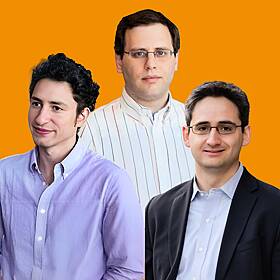
Oren Cass & Noah Smith Debate the True Impact of Tariffs
20 August - 1 hour 12 minsDo tariffs help rebuild American manufacturing or hold it back?
In this episode, American Compass founder and chief economist Oren Cass sits down with commentator and author Noah Smith and a16z General Partner Erik Torenberg for a lively debate on the future of U.S. industry.
They discuss the case for tariff-driven re-industrialization versus free-market approaches, the role of allies in trade policy, and what the numbers really show about manufacturing jobs, investment, and output. Along the way, they challenge each other’s assumptions and explore what it would take to actually bring more production back to American soil.
Timecodes:
0:00 Introduction & Framing the Debate
1:27 Oren...

Can AI Fix Housing and Healthcare Affordability?
Housing and healthcare make up nearly half of household spending, yet both sectors are riddled with inefficiency and rising costs. In this episode, Erik Torenberg is joined by a16z Growth partner Alex Immerman and Minna Song and Tony Stoyanov, cofounders of EliseAI, to discuss why they’re tackling these critical industries and how AI can transform everything from leasing and maintenance to patient scheduling and compliance. The conversation covers: Why the U.S. is 5 million housing units short — and how technology can help unlock existing supply How automation can cut waste, reduce labor costs, and improve affordability What fully autonomous buildings might look like, and how that model could extend to healthcare This is about the costs that touch every household, and the role AI might play in finally bringing them down.
39 mins
21 August Finished

Dylan Patel: GPT-5, NVIDIA, Intel, Meta, Apple
The AI hardware race is heating up, and NVIDIA is still far ahead. What will it take to close the gap? In this episode, Dylan Patel (Founder & CEO, SemiAnalysis) joins Erin Price-Wright (General Partner, a16z), Guido Appenzeller (Partner, a16z), and host Erik Torenberg to break down the state of AI chips, data centers, and infrastructure strategy. We discuss: - Why simply copying NVIDIA won’t work, and what it takes to beat them - How custom silicon from Google, Amazon, and Meta could reshape the market - The economics of AI model launches and the shift toward cost efficiency - Infrastructure bottlenecks: power, cooling, and the global supply chain - The rise of AI silicon startups and the challenges they face - Export controls, China’s AI ambitions, and geopolitics in the chip race - Big tech’s next moves: advice for leaders like Jensen Huang, Sundar Pichai, Mark Zuckerberg, and Elon Musk
1 hour 4 mins
18 August Finished

Google DeepMind Lead Researchers on Genie 3 & the Future of World-Building
Genie 3 can generate fully interactive, persistent worlds from just text, in real time. In this episode, Google DeepMind’s Jack Parker-Holder (Research Scientist) and Shlomi Fruchter (Research Director) join Anjney Midha, Marco Mascorro, and Justine Moore of a16z, with host Erik Torenberg, to discuss how they built it, the breakthrough “special memory” feature, and the future of AI-powered gaming, robotics, and world models. They share: -How Genie 3 generates interactive environments in real time -Why its “special memory” feature is such a breakthrough -The evolution of generative models and emergent behaviors -Instruction following, text adherence, and model comparisons -Potential applications in gaming, robotics, simulation, and more -What’s next: Genie 4, Genie 5, and the future of world models This conversation offers a first-hand look at one of the most advanced world models ever created.
41 mins
16 August Finished

The State of American AI Policy: From ‘Pause AI’ to ‘Build’
a16z General Partners Martin Casado and Anjney Midha join Erik Torenberg to unpack one of the most dramatic shifts in tech policy in recent memory: the move from “pause AI” to “win the AI race.” They trace the evolution of U.S. AI policy—from executive orders that chilled innovation, to the recent AI Action Plan that puts scientific progress and open source at the center. The discussion covers how technologists were caught off guard, why open source was wrongly equated to nuclear risk, and what changed the narrative—including China's rapid progress. The conversation also explores: - How and why the AI discourse got captured by doomerism - What “marginal risk” really means—and why it matters - Why open source AI is not just ideology, but business strategy - How government, academia, and industry are realigning after a fractured few years - The effect of bad legislation—and what comes next Whether you're a founder, policymaker, or just trying to make sense of AI's regulatory future, this episode breaks it all down.
42 mins
15 August Finished

H20s to China + 15% with Chris Miller and Lennart Heim
We’re sharing an episode from ChinaTalk that dives into one of the biggest recent reversals in U.S. tech policy. The U.S. banned Nvidia’s H20 AI chips to China in April. Now, just months later, they’re being sold—with a 15% export fee. What happened? Why the reversal? And what does it mean for the future of AI competition between the U.S. and China? Chris Miller—author of Chip War—and Lennart Heim from RAND join ChinaTalk host Jordan Schneider to unpack the policy flip-flop, why China is publicly downplaying interest in the H20, and why high-bandwidth memory and semiconductor manufacturing tools may be even more important than the Nvidia chips themselves.
1 hour 6 mins
14 August Finished





















